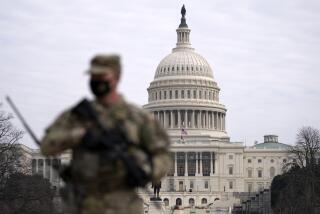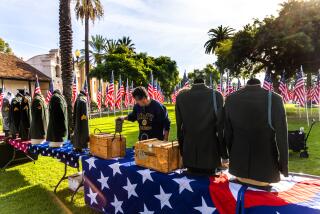Filipino veterans will get long-overdue payments because of stimulus bill
For more than 60 years, Cenon Antonio has waited for the payment promised by the U.S. government for fighting the Japanese after they conquered the Philippines early in World War II.
When the war was over, the United States reneged on its commitment to Antonio and other Filipino veterans, leaving what one U.S. senator calls a stain on the nation’s honor.
“When America was down, we Filipinos stood up and fought beside America, but when peacetime came, the Americans were stingy,” said Antonio, 82, who lives in San Diego.
Antonio said he still has nightmares of barely escaping capture by the Japanese, who tortured and killed prisoners. When Congress reneged in 1946 on the pledge to Filipinos, “it was like getting hit below the belt,” he said.
Now, Antonio and other surviving Filipino veterans, many of whom live in Southern California, will get their long-overdue payment under a provision in the stimulus bill signed Tuesday by President Obama.
The bill authorizes a $198-million payout. Each Filipino veteran who became a U.S. citizen is eligible for $15,000; each noncitizen, $9,000.
It is a bittersweet victory -- sweet because it represents a recognition of the bravery and sacrifice of the Filipinos; bitter because many veterans, including Antonio, think the payment is inadequate.
Antonio, a retired colonel in the Philippine army, said he remembers attacking Japanese patrols armed only with a knife, hiding Americans and bringing them food and medicine, rallying behind Gen. Douglas MacArthur when he returned and fighting beside the Americans in some of the war’s bloodiest combat.
“This payment is not nearly enough to compensate for what we did,” Antonio said.
Retired U.S. Army Col. Ed Ramsey, who escaped the Bataan Death March and organized Filipino guerrilla forces, agrees.
“It’s just a way to end it all, to make sure there are no more claims,” said Ramsey, 91, who lives in Los Angeles.
The bill represents a compromise between legislators who insisted that the payments were long overdue and others, particularly some Republicans in the House, who wanted no payments at all to be made while programs for U.S. veterans are still not adequately funded. The Filipino veterans had hoped for monthly pensions and survivor benefits.
“This is not really what we wanted, but I’ve told the veterans that we have to be realistic,” said Romeo Monteyro, 74, a retired colonel in the Philippine army who lives in Arizona and was part of the lobbying effort.
After the fall of Manila, many Filipinos took to the hills or hid in cities, often striking Japanese troops at night.
“We fought the Japanese with our hands,” said Manny Braga, 81, who later was sent by the U.S. Army to Guam and Okinawa. “This payment is insufficient.”
Braga, commander of the San Diego branch of the Filipino veterans association, noted that accepting the payment will preclude a veteran from making further claims, such as for disability payments.
Sen. Daniel K. Inouye (D-Hawaii), chairman of the Senate Appropriations Committee and a World War II veteran who pushed to include the authorization in the stimulus bill, called the payment “a matter of honor.”
“We have had measure after measure presented,” he said. “We did so in the proper fashion, and we got filibustered, we got ruled out and everything else.”
The Filipinos had been promised payments for their war service. But Congress passed the so-called Rescission Act in 1946, which withdrew that promise, although veterans were still eligible for U.S. citizenship and some medical benefits.
Rep. Bob Filner (D-Chula Vista), who has fought for the payments for 12 years, said the stimulus bill provision will “recognize the injustice” done to the Filipinos.
The legislation has been big news in the Philippines, where President Gloria Macapagal Arroyo issued a statement saying the legislation “culminates the many years of struggle that we have waged.”
Franco Arcebal, 85, a vice president of the American Coalition for Filipino Veterans, said it is unfortunate that the bill does not provide payments for the widows of veterans.
Of about 400,000 Filipinos who served, only about 15,000 are still living -- 12,000 in the Philippines and 3,000 in United States, according to the coalition.
Some of the veterans would have preferred a monthly pension, Arcebal said, but for others who are aging and possibly in ill health a onetime payment “comes in the nick of time.”
Arcebal, who lives in Los Angeles, is organizing a celebration of the bill at 10 a.m. today at Lake Street Park, just west of downtown Los Angeles, near a statue dedicated to the Filipino veterans.
“We’ve been waiting a long time,” he said.
--
richard.simon@latimes.com
--
(BEGIN TEXT OF INFOBOX)
400,000
Approximate number of Filipino veterans who fought alongside U.S. troops in the Pacific during World War II
15,000
Thought to be still alive
12,000
Living in the Philippines
3,000
Living in the U.S.
$198 million
Total payments authorized
$15,000
To those who became U.S. citizens
$9,000
To non-U.S. citizens
--
Sources: American Coalition for Filipino Veterans, Times reporting
More to Read
Start your day right
Sign up for Essential California for news, features and recommendations from the L.A. Times and beyond in your inbox six days a week.
You may occasionally receive promotional content from the Los Angeles Times.







